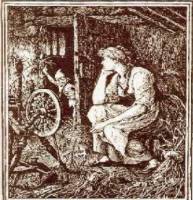
This professional development session focuses on the components of authentic learning. Participants will connect the components of authentic learning to a Rumpelstiltskin lesson. Read more »
Target Audience
Calendar Placement
Group Size
Intention Or Purpose
Related

This professional development session focuses on the components of authentic learning. The session is designed to have a minimum of eight participants. Participants will connect the components of authentic learning to a Rumpelstiltskin lesson and explore ways to make their own lessons more authentic... Read more »
Calendar Placement
Group Size
Intention Or Purpose

This professional development focuses on defining and promoting literacy strategies across all subject areas. Participants will examine how literacy components are necessary for their subject areas, identify the specific literacy strategies appropriate for their content, and discuss ways to implement... Read more »
Intention Or Purpose

Forging a path of strong community in an online classroom can be a challenge. Teachers and students are separated, and maintaining a sense of community relies on some of the same practices we use in the in-person classroom. However, when coupled with uniquely designed virtual materials, authentic teaching... Read more »
Target Audience
Calendar Placement
Group Size
Intention Or Purpose

This professional development will provide participants with literacy strategies to use in their classrooms as they implement document-based questions (DBQs). Read more »
Target Audience
Calendar Placement
Intention Or Purpose

This professional learning session focuses on providing teachers with foundational knowledge and strategies they can use to promote student autonomy. Participants will explore research on best practices for self-regulated learning, analyze learner motivation, reflect on personal teaching styles, and... Read more »
Target Audience
Calendar Placement
Group Size
Intention Or Purpose

Leadership is the process of working collaboratively to shape a culture of interdependence and trust to foster inclusive practices and serve a shared vision which responds to change for growth and promotes learning and empowerment for all stakeholders. Read more »
Target Audience
Calendar Placement
Group Size

This professional development session focuses on the components of authentic learning. The session is designed to have a minimum of eight participants. Participants will connect the components of authentic learning to a Rumpelstiltskin lesson and explore ways to make their own lessons more authentic... Read more »
Target Audience
Calendar Placement
Intention Or Purpose

Students will analyze President Lyndon B. Johnson's speech on voting rights. Students will also do a quick write regarding the current condition of voting rights in the United States using content from the speech and current events to substantiate their claims. Read more »
Voting Rights
Grade Level
Subject
Course
Standards

This lesson will focus on the impacts of the Cold War era in U.S. history. Guiding this lesson is an essential question focused on the use of fear. Hands-on activities, reading of a relevant news article, and argumentative writing will assist students in their exploration of brinkmanship and mutually... Read more »
Impact of the Cold War
Grade Level
Subject
Course
Standards

This lesson introduces students to what makes something living or nonliving. Students will investigate the characteristics of life by identifying the similarities and differences between organisms. Students will then use their knowledge to create dichotomous keys that will be used to determine if an... Read more »
Characteristics of Life and Cell Theory
Grade Level
Subject
Course
Standards

Students will apply the idea of generational change to the living world and to the inventive/technological world. Students need to have prior knowledge of the concept of speciation and factors that influence speciation. Read more »
Evolution: Cladogram
Grade Level
Course
Standards

This lesson explores the use of literacy tests during elections following Reconstruction. Students must understand the First, Thirteenth, Fourteenth, and Fifteenth Amendments prior to this activity. This lesson will allow students to investigate the purpose of literacy tests while also allowing students... Read more »
Post-Reconstruction America
Grade Level
Subject
Course
Standards

American Federal Government
Grade Level
This is the second lesson of a mini unit exploring the ideas of government structure, freedom, and whether governments truly protect our freedom. The student will assess the value of government by analyzing the structures of ruling bodies and how they influence the lives of citizens. Learners will... Read more »
American Federal Government
Grade Level
Subject
Course
Standards

In this lesson, students explore energy conservation based on how energy from the sun is captured and used to make chemical energy. Students also review how solar energy and the concept of photosynthesis have been used to engineer technology that could be beneficial to humans. This lesson can be used... Read more »
Photosynthesis
Grade Level
Subject
Course
Standards

In this lesson, students listen to a song while completing a painting activity. They collaborate to paint a list of descriptive words on their canvases based on the song. Considering the song lyrics as poetry, students analyze the song, focusing on descriptive language and sensory details. Students... Read more »
Communication: Using Descriptive Language
Subject
Grade Level
Standards

This lesson provides an overview of the key events and concepts of the Vietnam War. Using hands-on activities and discussions, students are able to explore the vocabulary and multiple perspectives of the war. This lesson is meant to be taught after this era and subject have been introduced to students.... Read more »
The Vietnam War
Grade Level
Subject
Course
Standards

In this lesson, students explore the historical period of the Progressive Era through analyzing photos and gain a deeper knowledge of this era by reading primary source documents. They learn about several social reform movements and create speeches and posters in order to rally their peers to support... Read more »
Key Periods in U.S. History
Grade Level
Subject
Course
Standards

Banned Books, Censorship Part 1
Grade Level
Through conversation and close reading, students will begin the study of a controversial work of literature by examining the pros and cons of trigger warnings in our society. Students will choose two published opinion pieces (one from both sides of the free-speech debate) and deconstruct the arguments... Read more »
Banned Books, Censorship Part 1
Grade Level
Subject
Course
Standards

During this interactive lesson, students will explore various map types, learn about the different features of maps, hone in on the unique qualities of their state's maps, and create their very own maps of the state of Oklahoma. Read more »
Geography
Grade Level
Subject
Course
Standards

This lesson focuses on the theme of mob mentality. Students will look for connections between informational text and a piece of fiction from the book "The Outsiders." Students will analyze the actions of characters from "The Outsiders" and determine whether the characters acted independently or as part... Read more »
Integrating Fiction and Nonfiction
Subject
Course
Grade Level
Standards

Students will use close reading strategies to analyze an author’s tone within nonfiction texts. The class will begin with modern music lyrics, then shift to famous passages of nonfiction writers. Through collaborative exercises, students will scaffold knowledge of word choice and structure to analyze... Read more »
Tone Analysis Through Music and Nonfiction
Grade Level
Subject
Course
Standards

Propaganda plays a significant role in influencing populations, especially in times of crisis. In this lesson, students will build on their knowledge about Paul Revere's role in the American Revolution by learning how he used propaganda to influence colonists' opinions through his engraving of the Boston... Read more »
Propaganda and the American Revolution
Subject
Course
Grade Level
Standards

Students will implement a close reading strategy to annotate and summarize an informational text about Generation Alpha slang. They will use context clues to infer the meaning of slang words. With the knowledge gained from reading, students will create their own Gen Alpha dictionary of definitions. Read more »
Summarizing Informational Texts
Subject
Course
Grade Level
Standards

Interdependence of Science, Engineering, and Technology on Society and the Natural World
Grade Level
In this lesson on the interdependence of science, engineering, and technology, students will use the example of snake venom to explore how natural resources can be used to make synthetic products that humans rely on. Students will learn and practice research strategies and evaluate sources. Finally,... Read more »
Interdependence of Science, Engineering, and Technology on Society and the Natural World
Grade Level
Subject
Standards

Students will examine various forms of earthquake data, ranging from intensity, magnitude, and first-person accounts, to explore which factors contribute to earthquake damage and how geologists use this information to pinpoint the epicenter and focus of an earthquake. Students will look at USGS data... Read more »
Earthquakes
Related
Grade Level
Subject
Standards

Students examine primary and secondary source documents and photos surrounding the Manhattan Project. Using a close reading strategy, they will highlight and summarize important information found in the documents in their own words. Students will also analyze photos from the Manhattan Project. Students... Read more »
World War II Era
Grade Level
Subject
Course
Standards

Students will use DNA processes such as replication, transcription, and translation to study the differences between healthy individuals and those with a genetic disorder (in this case, cystic fibrosis). Students will apply this knowledge to the inheritance of traits through the use of Punnett squares. Read more »
DNA Processes
Grade Level
Subject
Course
Standards
In this lesson, students explore gas production by micro-organisms by designing and experimenting with biogas digesters made from small water bottles. Read more »
Anaerobic Respiration
Grade Level
Course
Standards

In this lesson, students will analyze primary and secondary sources to determine the push and pull factors that led immigrants to come to the United States by the millions in the 1880s through the 1920s. It will also examine the immigrant experience upon arriving in the United States, including the... Read more »
U.S. History
Grade Level
Subject
Course
Standards

Students investigate the properties and impacts of coronal mass ejections (CMEs) on the Earth. Based upon the activity, this is best for older students or very precocious younger high school students. A prerequisite would be basic physical science, but can easily be approached early on in an environmental... Read more »
Coronal Mass Ejections / Space Storms
Grade Level
Subject
Course
Standards

This lesson invites students to explore three monotheistic religions: Judaism, Christianity, and Islam. Students begin the lesson by sharing their prior knowledge of the three religions and collaborating with partners to expand their understanding through discussion. Student groups then read articles... Read more »
Monotheistic Religions
Grade Level
Subject
Course
Standards

Health and Media Literacy: Advertising Practices in the Tobacco Industry
Grade Level
This health and media literacy lesson is intended to raise awareness of predatory advertising practices in the tobacco industry. Read more »
Health and Media Literacy: Advertising Practices in the Tobacco Industry
Grade Level
Standards

This lesson is based on the short story "The Lady, or the Tiger?" by Frank R. Stockton. Students will summarize the story and analyze each character's personality and internal conflict. Students will also identify the external conflict through the plot and setting. The author does not provide an ending... Read more »
Internal & External Conflict
Subject
Course
Grade Level
Standards
In this lesson, students learn to compare and contrast geographical features found among different regions in the United States. Students will then apply these skills by comparing their home state's features with those of another state in the nation. Read more »

Students will read and interact with the short story, "The Most Dangerous Game." They will focus on making predictions, analyzing the text, and evaluating the characters—namely protagonist v. antagonist. Read more »
Protagonist & Antagonist
Subject
Grade Level
Standards

Students will discuss and evaluate the importance of managing and reconciling a bank account. Using a scenario, students will create a fictitious bank account register. Students also will investigate various local banks' checking account policies and compare them. Finally, students will draw conclusions... Read more »
Standard 4: Managing a Bank Account
Grade Level
Subject
Course
Standards

This lesson analyzes the context and setting of the novel "Of Mice and Men." This cross-curricular lesson previews societal issues that were prevalent in John Steinbeck's text. Steinbeck was a young man during the Great Depression, and he wove the background and context of the Great Depression into... Read more »
Background & Setting
Subject
Course
Grade Level
Standards

Understanding Asthma
Grade Level
In this introductory lesson to the Connecting Social Issues and Human Health Inequities unit, students will explore asthma through a variety of station activities, videos, readings, and charts. In doing so, students will better understand what occurs in the respiratory system before, during, and after... Read more »
Understanding Asthma
Grade Level
Subject
Course
Standards

Environmental Racism in America
Grade Level
During this fifth and final lesson in the Connecting Social Issues and Health Inequalities unit, students will analyze Marvin Gaye's song, "Mercy, Mercy Me," discuss the history of environmental racism in America, and complete and present their project proposals. Read more »
Environmental Racism in America
Grade Level
Subject
Course
Standards

In this lesson, students will explore biotic and abiotic factors and the essential elements that are cycled throughout Earth’s many ecosystems. Students will determine how the cycling of these elements sustains life and then will create their own closed ecosystems. Read more »
Biology
Subject
Course
Grade Level
Standards

In this lesson, students will participate in a “Tip of the Iceberg” activity to track what they know about using loops throughout the lesson. First, students will create a loop using Chrome Music Lab’s Melody Maker. Then, they will discuss what a loop is and watch a professional musician build a full... Read more »
Creating Music with Loops
Grade Level
Course
Subject
Standards

In this lesson, students will research, analyze, and evaluate the history of the Indian Reorganization Act, individual tribal governments, and their impact on Native Americans. Students will watch a short video describing the purpose of tribal governments. Then, they will choose one of the 39 Oklahoma... Read more »
Tribal Governments
Grade Level
Subject
Course
Related
Standards

Designing YouTube Content Using World Languages
Grade Level
Students discuss their favorite content creators on YouTube. They explore different content creators on a Wakelet and consider what it is about the video that makes it intriguing. Students learn from a YouTube content creator that creating YouTube videos is "kind of like an octopus"—you need a lot of... Read more »
Designing YouTube Content Using World Languages
Grade Level
Course
Standards

Students discuss their favorite content creators on YouTube. They explore different content creators on a Wakelet and consider what it is about the video that makes it intriguing. Students learn from a YouTube content creator that creating YouTube videos is "kind of like an octopus"—you need a lot of... Read more »
Creating Instructional Content for YouTube
Grade Level
Subject
Standards

Changes in the Earth Over Time: What’s the Evidence?
Grade Level
In this lesson, students learn how geological time can be predicted by examining strata layers and fossil evidence. They explore different rock strata and fossils, making comparisons and inferences. Using provided specimens, students determine which species existed during various time periods in Earth's... Read more »
Changes in the Earth Over Time: What’s the Evidence?
Sponsor
Grade Level
Subject
Course
Standards

In this lesson, students examine how Einstein’s spacetime is warped by mass, and they learn to use this idea to explain how gravity holds the solar system together. Students investigate spacetime being warped by using a Fabric of Spacetime Table and then apply Newton’s Law of Gravitation to derive the... Read more »
Universal Law of Gravity
Grade Level
Subject
Course
Standards

In this lesson, students explore what a Faustian bargain is and examine examples in literature and pop culture. Students read, watch, listen, discuss, and write an argument as they work through the concept and its lasting legacy. Read more »
Robert Johnson and Faustian Bargains
Grade Level
Subject
Standards

Real Interest Rates and Financial Institutions
Grade Level
In this lesson, students step into the shoes of George Bailey from It’s a Wonderful Life as they explore different types of financial institutions and examine how changes in interest rates and salaries affect our willingness to make major purchases on big-ticket items such as cars and houses. Students... Read more »
Real Interest Rates and Financial Institutions
Grade Level
Subject
Course
Standards

In this lesson, students begin by evaluating statements to decide if they are always, sometimes, or never true, building their critical thinking skills. They then explore Jonathan Swift’s A Modest Proposal, annotating and analyzing the text. Next, students identify an issue from their school, society,... Read more »
Satire
Grade Level
Subject
Course
Related
Standards

Pronouns and Antecedents
Grade Level
In this lesson, students will learn how to correctly use pronouns and antecedents, a common skill tested on the ACT English section. They will review how pronouns must agree with their antecedents in number, person, and case and practice to avoid vague or ambiguous references. Students will analyze... Read more »
Pronouns and Antecedents
Grade Level
Subject
Standards

Students analyze the fairy tale Rumpelstiltskin to explore how point of view influences understanding of heroes and villains. Using the CUS and DISCUSS strategy, students will annotate the text from their character’s perspective and collaborate to build a defense using the CER (Claim, Evidence, Reasoning)... Read more »
Connecting Evidence to Argument
Grade Level
Subject
Course
Related
Standards

